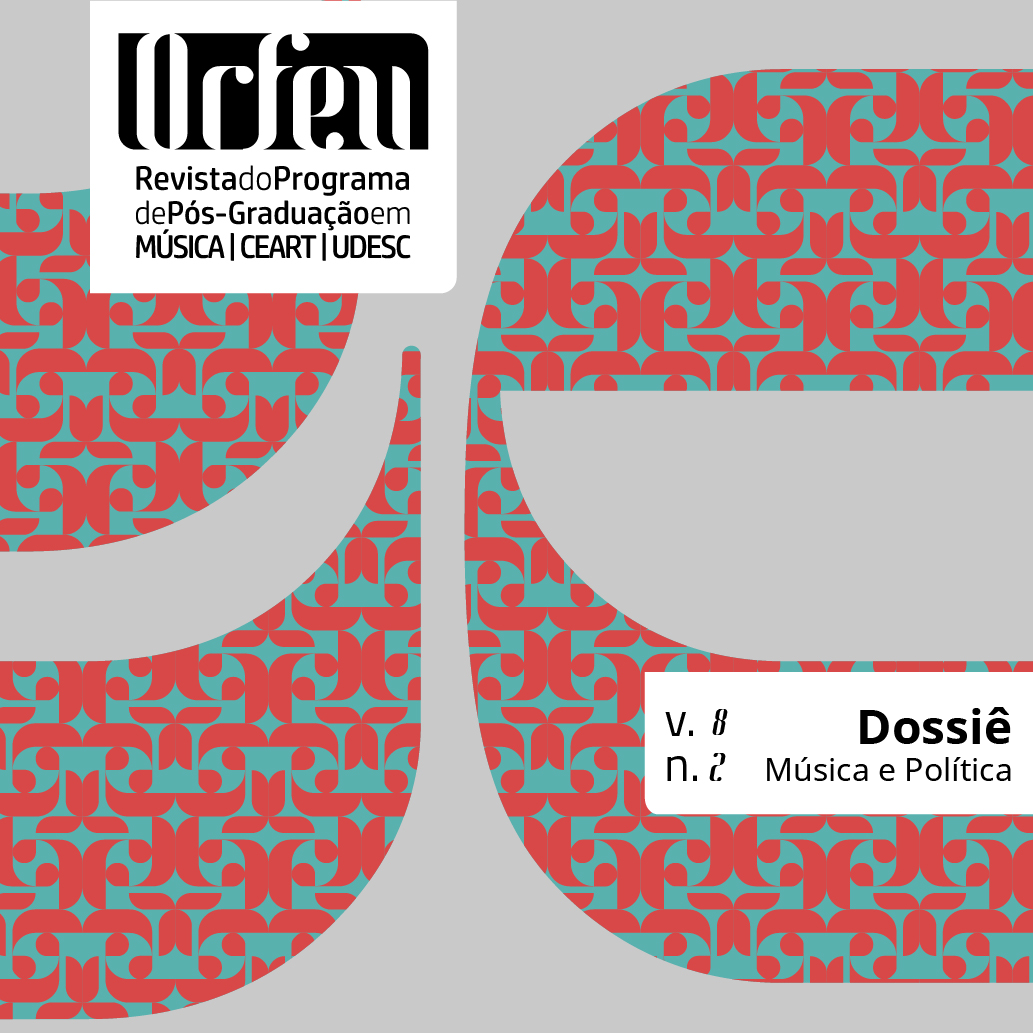TÁR: hierarquias de poder, política e regentes
DOI:
https://doi.org/10.5965/2525530408022023e0105Palavras-chave:
poder político, hierarquias de poder, regentes, TàrResumo
No filme TÁR, o diretor Todd Field vale-se do universo da música orquestral como pano de fundo para refletir sobre as diversas estruturas de poder. Inversamente, o objetivo deste artigo é utilizar o filme para discutir os bastidores das relações políticas vinculadas à função de regente de orquestra. Assim, no decorrer deste texto, alguns momentos do filme serão analisados e confrontados com acontecimentos históricos envolvendo personalidades reais do contexto da música de concerto. A intenção é considerar como a função de regente foi transformada, passando da postura autocrática para uma conduta colaborativa. A literatura técnica da área de regência será objeto de comparações. A fundamentação das reflexões sobre poder e política se dará em escritos de Norberto Bobbio e Hannah Arendt. Em conclusão, observa-se que, não obstante à desejada modificação no comportamento do regente preconizada na literatura, no Brasil, as relações de poder entre políticos e regentes permanecem praticamente inalteradas.
Downloads
Referências
ARENDT, Hannah. O que é política? Fragmentos das Obras Póstumas compilados por Ursula Ludz. Tradução de Reinaldo Guarany. Rio de Janeiro: Bertrand Brasil, 1998.
BAPTISTA, Raphael. Tratado de Regência aplicada à orquestra, à banda de música e ao coro. Rio de Janeiro: Irmãos Vitale, 1976.
BOBBIO, Norberto; BOVERO, Michelangelo. Origenes y fundamentos del poder político. Tradução de José Fernández Santillán. México: Editorial Grijalbo, 1985.
BOWEN, José Antonio (Ed.). The Cambridge companion to conducting. New York: Cambridge University Press, 2008.
BRUSILOW, Anshel; UNDERDAHL, Robin. Shoot the conductor: too close to Monteux, Szell, and Ormandy. Denton: University of Texas Press, 2015.
CARRAS, Christi. This real-life conductor is mentioned in ‘Tár.’ And she’s not a fan of the film. In: Los Angeles Times, 11/01/2023. Disponível em: Marin Alsop, real conductor mentioned in 'Tár,' slams film - Los Angeles Times (latimes.com)
CHARMAN, Helen. The Limits of Control: Lines of Power in Todd Field's "Tár". Publicada em março de 2023. Disponível em: https://mubi.com/pt/notebook/posts/the-limits-of-control-lines-of-power-in-todd-field-s-tar
COOPER, Michael. For Orchestras in the U.S., So Much Depends on Their Communities’ Fortunes. In: The New York Times, 02/10/2016, disponível em: https://www.nytimes.com/2016/10/02/arts/music/philadelphia-orchestra-strike.html
FINKLEA, Robert. What Sank the Dallas Symphony Orchestra—After 74 Years? In: The New York Times, June 9, 1974. Disponível em: https://www.nytimes.com/1974/06/09/archives/what-sank-the-dallas-symphony-orchestraafter-74-years-the-sad-story.html
FREIRE, Paulo; SHOR, Ira. Medo e ousadia – o cotidiano do professor. Rio de Janeiro: Paz e Terra, 1986.
FUCCI-AMATO, Rita. GALATI Martinho Lutero. Do gestão à gestão : um diálogo sobre maestros e liderança. São Paulo: nVersos, 2013.
HAAG, Carlos. Isaac Karabtchevsky: O som do gesto. In: Revista Pesquisa Fapesp, Edição 181, mar. 2011. Disponível em: https://revistapesquisa.fapesp.br/isaac-karabtchevsky-o-som-do-gesto/
KAMMHOLZ, Karsten. Der Mann, der zweimal in die NSDAP eintrat. In: Die Welt, 26 de janeiro de 2008. Disponível em: https://www.welt.de/vermischtes/article1595506/Der-Mann-der-zweimal-in-die-NSDAP-eintrat.html
LAGO JUNIOR, Sylvio. A Arte da Regência: História, Técnica e Maestros. Rio de Janeiro: Lacerda editores, 2002.
LEBRECHT, Norman. The maestro myth: great conductors in pursuit of power. New York: Kensington Publishing Corp., 2001.
________ . Reports: settlement finally reached in Brazil Orchestra standoff. In: Slippedisc – the classical music news site. Matéria publicada em 03/09/2011. Disponível em: https://slippedisc.com/2011/09/reports-settlement-in-brazil-orchestra-standoff/
LOCKE, John. Segundo tratado sobre o governo. Tradução de E. Jacy Monteiro. In: John Locke (2ª ed.). São Paulo: Abril Cultural, 1978. p. 31-131.
MAÇANEIRO, Cassiano. Reflexões sobre o caso OSB. In: Cultura e Mercado. Matéria publicada em 08/04/2011. Disponível em: https://culturaemercado.com.br/reflexoes-sobre-o-caso-osb/
MAUCERI John. Maestros and Their Music: The Art and Alchemy of Conducting. New York: Knopf Doubleday Publishing Group, 2017.
MEIER, Gustav. The score, the orchestra, and the conductor. New York: Oxford University Press, 2001.
MINCZUK, Arcadio. O contexto histórico, político e econômico de orquestras sinfônicas no Brasil. Tese de doutorado defendida no PPG História da Ciência na Pontifícia Universidade Católica de São Paulo, 2014.
MIRANDA, Clarice; JUSTUS, Liana. Orquestra - Histórico, Regência e Instrumentos.
Editora Solar do Rosário, 2011.
NESCHLING, John. Música Mundana. Rio de Janeiro: Editora Rocco, 2009.
OSBORNE, Richard. Conversando com Karajan. Tradução J. E. Smith Caldas. São Paulo: Editora Siciliano, 1992.
__________ . Herbert von Karajan: a life in music. Boston: Northeastern University Press, 2000.
RAPPAPORT, Julian. Community psychology: values, research, and action. New York: Holt, Rinehart and Winston, 1977.
_________. In praise of paradox. A social policy of empowerment over prevention. In: American Journal of Community Psychology, Vol. 9 (1), 1981, 1–25.
RINALDI, Arthur; DE LUCA, Beatriz; NERY, Daniel; VAZOLER, Luciano. O Regente Sem Orquestra. Exercícios Básicos, Intermediários e Avançados. São Paulo: Editora Algol, 2008.
ROCHA, Ricardo. Regência - uma Arte Complexa. Rio de Janeiro: Editora Ibis, 2004.
TARASTI, Eero. Heitor Villa-Lobos: vida e obra (1887-1959). Trad.: Paulo de Tarso Salles, Rodrigo Felicíssimo, Claudia Sarmiento. São Paulo: Editora Contracorrente, 2021.
WITTRY, Diane. Beyond the baton: what every conductor needs to know. New York: Oxford University Press, 2007.
Downloads
Publicado
Como Citar
Edição
Seção
Licença
Copyright (c) 2023 Antenor Ferreira Corrêa

Este trabalho está licenciado sob uma licença Creative Commons Attribution 4.0 International License.






